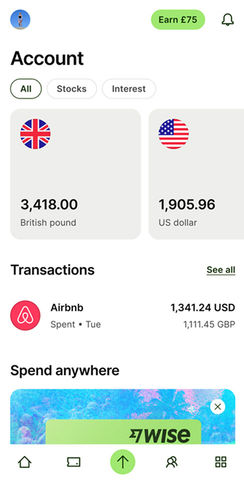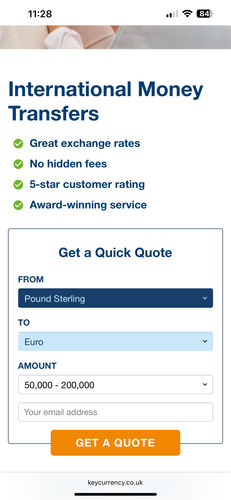Send money to Thailand
"Over 16 million customers use Wise, mostly for their excellent mobile app, transparent fee structure & use of mid-market rates. Now increasingly used for larger transfers."
"Xe has over 30 years of currency exchange experience, and is one of the most reputable names on the market. 200 countries, 100 currencies, & funds often received in seconds."
"Over 16 million customers use Wise, mostly for their excellent mobile app, transparent fee structure & use of mid-market rates. Now increasingly used for larger transfers."
"Currencies Direct have over 30 years of global money transfer expertise. Award winning service with a TrustPilot rating of 4.9. Lock-in rates for the future or trade 24/7 on web or mobile."
"Revolut has 50+ million customers globally. You can hold up to 36 currencies in the app and send money quickly in 70+ currencies to 160+ countries."
"24/7 live chat support provided in six languages. Special first transfer rates available, with airtime topup supported to many countries in Africa, Asia and South America."
"OFX have been helping individuals and businesses send money for over 25 years. Transfer in 50+ currencies to 170+ countries, with 24/7 phone access to currency experts."
"Key Currency offers a personal service with a dedicated account manager. There are no transfer limits or fees which is perfect for larger send amounts."
"Xe has over 30 years of currency exchange experience, and is one of the most reputable names on the market. 200 countries, 100 currencies, & funds often received in seconds."
"Regency's UK-based account management team has vast experience. Get support on all kinds of transfers, from overseas property transactions to business payments & more."
"Remitly focuses on sending money to friends and family in Asia, Africa and South America. Wide coverage and well-suited to regular transfers home."
"Lumon has cared for over 69,000 customers since 2000. Get support for larger transfers from dedicated currency specialists."
"Xoom, a PayPal service, allows you to send money in more than 160 countries. You can send cash for over-the-counter pickup or home delivery, as well as send by bank transfer or debit card."
"Securely send money to and from 150+ countries and 20+ currencies. Same-day transfers avaialble on most major currencies."
"Sendwave is trusted by over 1 million users across the US, UK, Canada and EU. 24/7 support is available online and via the app."
"Fast, secure internatinal transfers with no fees and transparent rates. They offer a free currency card for use at home and abroad."
"Send money to over 40 destinations online and in the mobile app."
"Paysend has transparent fees and rates, with transfer sent within seconds to your recipient's bank. They also have global 24/7 support for any enquiries, and bank-level security."
"Moneycorp is an established player in the market, with a focus on private clients and corporates. Make overseas payments in over 120 currencies and 190 countries."
"Moneygram is a well established service with over 80 years in the sector. They support over 200 countries worldwide and have over 440,000 retail locations."
How to get the best rate when sending money to Thailand
Wise: The best way to send money to Thailand
We’ve tested 18 companies offering services in Thailand, and Wise stood out as the best money transfer company to Thailand.
They offer low fees of just $46.05 and -0.01% markup on THB exchange rates, and fast transfer speeds.
Wise offers an ideal combination of features, speed, and cost for THB transfers.

The cheapest way to send money to Thailand: Key Currency
From the 18 companies tested, Key Currency consistently offers the cheapest money transfer THB to Thailand.
Key Currency charges $0 per transfer to Thailand and applies a 0.25% markup on the THB exchange rate.
For the best value, use a bank transfer deposit to maximize the amount of THB received.

Fastest way to send money to Thailand: Wise
Our data shows that Wise is the fastest way to transfer THB right now.
With Wise, the transfer time to Thailand is within minutes (for a $7,000 transfer).
Wise charges $46.05 in fees on $7,000 transfer and adds a -0.01% markup.
The ‘fastest’ way to transfer money to Thailand includes the transfer amount, deposit method, and transfer and withdrawal times.

Easiest way to send money to Thailand: Wise
We recommend Wise if you are after convenience. Their app is made for THB transfers on the go, their fees are low, and transfer times are fast.
They may not always be the cheapest or the fastest for transfers to Thailand, but the difference would be minimal, especially on smaller THB transfers.
By “easiest”, we mean the service that is easy to get started with, is fully transparent, and offers a good balance of cheap and fast transfers.

Consider this before sending money to Thailand
Compare providers
Don't settle for the first option. Always compare ways to send money to Thailand to find out about fees, speed, and reliability.
Our analysis included 18 providers that operate in Thailand.
Through this, you get a comprehensive view of all the options you have when sending money to Thailand.
Think about the Baht exchange rates
Choose the right payment method
Consider transfer limits
Consider the speed
Ways you can send THB to Thailand
How to receive money in Thailand
Have your documents ready
Don't forget about taxes
Making large money transfers to Thailand
When sending large amounts of Baht to Thailand, it's important to consider factors like the limits, THB rates, customer support, as well as legal and government-imposed restrictions in Thailand.
Wise is our top recommendation for moving large amounts of THB.
Whether you're purchasing property in Thailand, need to pay tuition fees, have a wedding there, or transfer money for business in Thailand, Wise will ensure a smooth and secure transaction.
Of all the companies we’ve tested and reviewed that specialize in large THB transfers, Wise consistently ranked as the top-rated choice.
They charge $46.05 per transfer and apply -0.01% markup on top of the THB exchange rate, making them perfect for moving big amounts.

Understand the costs of money transfers to Thailand
The total cost of THB transfers depends on your location, the amount of THB sent, the delivery/deposit methods, transfer fees, and the markup applied to the THB exchange rate.
Transfer fee
The money transfer service you use to send Baht can apply a fixed fee, a percentage-based fee, or a combination of both.
For example, a $7,000 transfer to Thailand will cost you $0 in fees with Key Currency, based on our September 2025 analysis of 18 services supporting Baht transfers.
THB exchange rate markup
An exchange rate markup is the percentage added to the mid-market THB rate.
Using the same example, Wise offers the best THB exchange rates, with a -0.01% markup on the USD-THB rate. This means for every USD sent, you receive 32.2555 THB with -0.01% deducted from it.
Deposit method
How you fund your transfer can significantly impact the overall cost.
Bank transfer is the most common option, costing up to $490 per transfer to Thailand.
Debit card transfers can go as high as $0 in fees, while credit cards are usually more expensive and may include additional cash advance fees.
bank transfer is the cheapest payment method for sending THB.

Getting the best THB rate when sending money to Baht
The exchange rate is the value of the Baht (THB) compared to other currencies. Since it consistently moves up and down, sending at the high will give your receiver more THB compared to the low.
In the past 7 days, the THB exchange rate reached:
An average rate of 31.8767 Baht per US Dollar
A high of 31.946 THB per USD
And a low of 31.8285 THB per US Dollar
The THB/USD exchange rate has seen some movements. Making a transfer when the rate is close to 31.946 THB/USD will result in more THB received.
Wise is our top recommendation for sending Baht, offering a markup of -0.01% which is 0% better than the next cheapest option.
Get notified when it’s the best time to transfer Baht
Sign up for our rate alerts, and we’ll notify you when it’s the best time to send THB!
Payment methods available to fund your transfer to Thailand
How we analyze the market
We track the cost, speed, and product offerings of the leading money transfer services available in Thailand.
Our comparison engine and algorithms evaluate providers based on over 25 factors, including transfer fees, ease of use, exchange rates, mobile apps, transfer times & customer support.
We also consider how these services are rated on platforms like TrustPilot, AppStore, and Google Play, giving you a comprehensive view of what to expect.
This thorough analysis helps you get the best available deal - every time you want to move money to Thailand.
We also provide unbiased and detailed reviews of all the top money transfer companies. You can use these reviews to find the best service for your needs when sending money to Thailand
For a deeper understanding of our commitment to integrity and transparency, we invite you to read our editorial policy and review methodology.

Related transfer routes
Send money from Thailand
Send money to Thailand
FAQs
Find answers to the most common questions on our dedicated FAQ page.



.svg)











.svg)

























